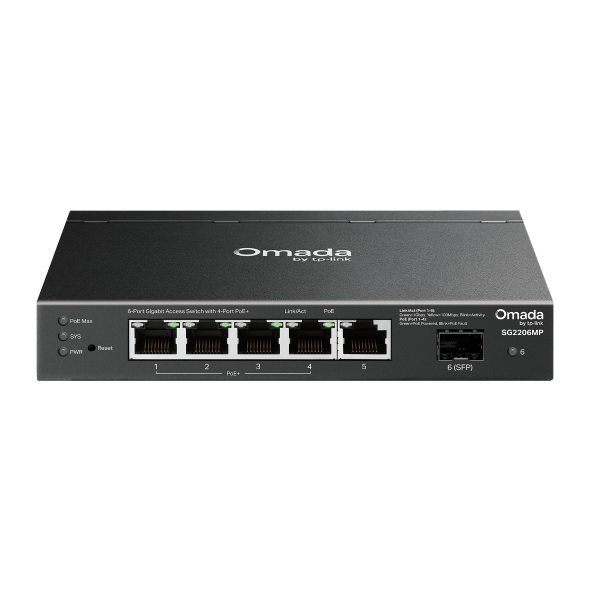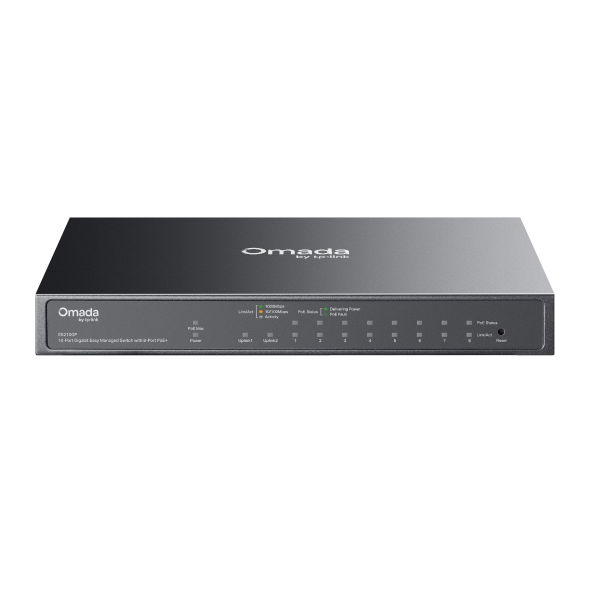What Is PoE?
Power over Ethernet (PoE) is a technology that allows network switches to transmit both power and data through an Ethernet cable simultaneously.
Multiple Applications
The benefits of PoE switches have become more evident with the rapid expansion of network-connected devices. They offer more effective solutions for connecting numerous PoE-compatible devices like VoIP, IP cameras, and access points—meeting the demands of most common business scenarios.
-
Surveillance
Works with IP Cameras
-
Conference Call
Works with IP Phones
-
Wi-Fi Coverage
Works with Omada EAPs
-
Wired Connections
Works with PCs and Printers
Why Do You Need the PoE Switch?
Traditional Switches
Traditional switches cannot supply power for end devices over Ethernet. This requires additional PSEs and extension cables.
PoE Switches
PoE switches minimizing cable usage and makes things easier by saving costs on power outlets, infrastructure equipment and electrical installation.
-
No Fuss
Simplify the installation and streamline the deployment—no need for electricians.
-
Cost-Efficiency
No need for additional cables and power adapters—reduce costs on infrastructure.
-
Flexibility
More placement options allow for deployment in complex environments.
-
Power Management
Intelligently protects your devices from power surges and maximizes power usages.
What Can You Power with PoE Switch?
PoE switches are separated by their supported standards. Before choosing your PoE solutions, you need to be aware of how much power your devices draw. With that information, you’ll know which standard and business solution suits your needs.
PoE (802.3af)
up to 15.4 W per port
-
IP Phones
-
Basic IP Cameras
-
802.11n APs
PoE+ (802.3at)
up to 30 W per port
-
IP Video Phones
-
PTZ HD IP Cameras
-
802.11ac (WiFi 5) APs
-
Small Audio Speakers
-
Small Audio Speakers
PoE++ (802.3bt)
up to 60/90 W per port
-
PTZ HD IP Cameras with Heaters
-
802.11ax (WiFi 6) APs
-
Smart Building Lighting
-
Audio System
-
Thin Clients
Why Choose TP-Link PoE Switches
More than providing basic features, TP-Link PoE switches offers value well beyond general networking demands. They create a versatile and reliable network to grow your business.*
-
Extend Mode ButtonExtend Mode OnUp to 250 mExtended is 10 Mbps/portIP CamerasExtend Mode Off100 mDefault is 100 Mbps/portIP Cameras
Long-Range Transmission
With Extend Mode, PoE supports data and power transmissions up to 250 m away—perfect for the deployment of surveillance cameras in large areas.
-
Priority Mode Button
High
Low
Port Prioritization
Ensure the quality of sensitive applications like video and voice in critical business areas by prioritizing the data of certain ports.
-
Isolation Mode Button
Traffic Separation
Isolation Mode divides traffic for downlink ports to avoid snooping and tampering. It isolates broadcast storm for higher security.
-
Poe Auto Recovery
IP Cameras
IP Cameras
PoE Auto Recovery
Detects and reboots dropped or unresponsive PoE-powered devices.
-
Cloud Centralized Management
Managed PoE switches integrated Omada SDN (Software Defined Networking) provide 100% centralized cloud management to create highly scalable networks—all controlled from a single interface anywhere, anytime.
-
10G PoE Switch
Gigabit PoE Switch
WiFi 6 AP
2.5/10 GE PoE for WiFi 6
Premium 10G/multi-gigabit PoE switches are provided to meet the full bandwidth potential of WiFi 6 access points. PoE, PoE+, and PoE++ are also supported to fully power up your WiFi 6 APs.
Help You Choose
Answer some short questions and we’ll show you the switches that best fit your needs.
Unmanaged
- Plug and Play
- Sufficient Functions
- Budget-Friendly
Easy Smart
- Useful Management Features
- Web-Based Interface
- Easy to Use
Smart & L2+ Managed
- Centralized Cloud Management
- 2.5G / 10G High-Speed Options
- Advanced Management Features
How to Select the Right Switch
Managed FunctionsUnmanaged Switches: Support plug and play without configuation required but also offer sufficient functions like 250 m PoE tansmission, port prioritization, and traffic separation. Easy Smart Switches: A variety of useful features are provided such as VALN, QoS, IGMP Snooping, and PoE Auto Recovery to enhance your network safety and reliability. Smart & L2 Managed: More advanced and high-level management options such as Omada SDN Cloud Platform help control your network anytime, anywhere. |
Number of PortsHow many IP cameras do you need to connect to your network? Make sure you select a switch with enough ports to connect all your devices on your LAN. If your busine ss is at the rapid growth phase, select a switch with abundant network capacity to grow with your demands. |
Port SpeedDetermine the required port speed based on user needs and PD bandwidth. 100 M bandwidth is sufficient to meet the requirements of IPCs system while gigabit and multi-gigabit futureproof your network with higher scalability. |
PoE BudgetEach IP camera has a budget, the minimum power required over Ethernet for it to function. When considering suitable switches, check the budget per port to ensure that it is sufficient to power your IP cameras |
PoE or PoE+· PoE (802.3af) is the original PoE standard and offers 15.4W of power to the Ethernet port · PoE+ (802.3at) is the latest standard which almost doubles the available budget, providing 30W of power to the Ethernet port and futureproofing your network with the latest power over Ethernet standards. |
View All Models
Ceiling Mount
-

EAP723
BE5000 Ceiling Mount Wi-Fi 7 Access Point
-
 New
NewEAP772
BE9300 Ceiling Mount Tri-Band Wi-Fi 7 Access Point
-

EAP683 UR
AX6000 Ceiling Mount WiFi 6 Access Point
-

EAP670
AX5400 Ceiling Mount WiFi 6 Access Point
-
 New
NewEAP650
AX3000 Ceiling Mount WiFi 6 Access Point
-
 New
NewEAP660 HD
AX3600 Wireless Dual Band Multi-Gigabit Ceiling Mount Access Point
-

EAP653 UR
AX3000 Ceiling Mount WiFi 6 Access Point
-
 New
NewEAP620 HD
AX1800 Wireless Dual Band Ceiling Mount Access Point
-
4.0-F_normal_1593323206680k.png)
EAP245
AC1750 Wireless MU-MIMO Gigabit Ceiling Mount Access Point
-

EAP225
AC1200 Wireless Dual Band Gigabit Ceiling Mount Access Point
-

EAP673
AX5400 Ceiling Mount WiFi 6 Access Point
-

EAP653
AX3000 Ceiling Mount WiFi 6 Access Point
-

EAP610
AX1800 Ceiling Mount WiFi 6 Access Point
Show All 13 Ceiling Mount
Switches
-
 New
NewFesta FS352GP
52-Port Gigabit Smart Switch with 48-Port PoE+
-
 New
NewFesta FS328GP
28-Port Gigabit Smart Switch with 24-Port PoE+
-
 New
NewFesta FS318GP
18-Port Gigabit Smart Switch with 16-Port PoE+
-
 New
NewFesta FS310GP
10-Port Gigabit Smart Switch with 8-Port PoE+
-
 New
NewFesta FS308GP
8-Port Gigabit Smart Switch with 4-Port PoE+
Wall Plate
Outdoor
-
 New
NewEAP215-Bridge KIT
Wireless Bridge 5 GHz 867 Mbps Long-Range Indoor/Outdoor Access Point
-
 New
NewEAP211-Bridge KIT
Wireless Bridge 5 GHz 867 Mbps Indoor/Outdoor Access Point
-

EAP772-Outdoor
Omada Tri-Band Omnidirectional BE11000 Indoor/Outdoor WiFi 7 Access Point
-
 Coming Soon
Coming SoonEAP625-Outdoor HD
AX1800 Indoor/Outdoor Wi-Fi 6 Access Point
-

EAP623-Outdoor HD
AX1800 Indoor/Outdoor Wi-Fi 6 Access Point
-

EAP225-Outdoor
AC1200 Wireless MU-MIMO Gigabit Indoor/Outdoor Access Point
-

EAP650 D120-Outdoor
AX3000 Indoor/Outdoor WiFi 6 Access Point
-

EAP110-Outdoor
300Mbps Wireless N Outdoor Access Point
-

EAP650 D30-Outdoor
AX3000 Indoor/Outdoor WiFi 6 Access Point
-

EAP650-Outdoor
AX3000 Indoor/Outdoor WiFi 6 Access Point
-
 Coming Soon
Coming SoonEAP610-Outdoor
AX1800 Indoor/Outdoor WiFi 6 Access Point
Show All 11 Outdoor
GPON
Campus
-
1.0_Omada_Enterprise_L3_Switch-1000px_normal_20231110114352k.png) New
NewSG6428XHP
Omada 24-Port Gigabit Stackable L3 Managed PoE+ Switch with 4 10G Slots
-

SG5452XMPP
Omada 48-Port Gigabit Stackable Lite L3 Managed PoE++ Switch with 4× 10G Slots
-

SG5428XMPP
Omada 24-Port Gigabit Stackable Lite L3 Managed PoE++ Switch with 4× 10G Slots
-
1.0_normal_20231110073416j.png)
SG6654XHP
Omada 48-Port Gigabit Stackable L3 Managed PoE+ Switch with 6 10G Slots
Access Max
Access Pro
-
1.0_Omada_2.5G_Switch-1000px_normal_20231109030542p.png)
SG2210XMP-M2
Omada 8-Port 2.5GBASE-T and 2-Port 10GE SFP+ Smart Switch with 8-Port PoE+
-
 New
NewSG3428XPP-M2
Omada 24-Port 2.5GBASE-T and 4-Port 10GE SFP+ L2+ Managed Switch with 16-Port PoE+ & 8-Port PoE++
-

SG3218XP-M2
Omada 16-Port 2.5G and 2-Port 10GE SFP+ L2+ Managed Switch with 8-Port PoE+
-

SG3210XHP-M2
Omada 8-Port 2.5GBASE-T and 2-Port 10GE SFP+ L2+ Managed Switch with 8-Port PoE+
Access Plus
-
 New
NewSG3428XMPP
Omada 24-Port Gigabit and 4-Port 10GE SFP+ L2+ Managed Switch with 16-Port PoE+ & 8-Port PoE++
-

SG3452XP
Omada 48-Port Gigabit and 4-Port 10GE SFP+ L2+ Managed Switch with 48-Port PoE+
-

SG3452XMPP
Omada 48-Port Gigabit and 4-Port 10GE SFP+ L2+ Managed Switch with 40-Port PoE+ & 8-Port PoE++
-

SG3428XMP
Omada 24-Port Gigabit and 4-Port 10GE SFP+ L2+ Managed Switch with 24-Port PoE+
Access
-

SG2218P
Omada 18-Port Gigabit Smart Switch with 16-Port PoE+
-

SL2428P
Omada 24-Port 10/100Mbps + 4-Port Gigabit Smart Switch with 24-Port PoE+
-
 New
NewSG2008P
Omada 8-Port Gigabit Smart Switch with 4-Port PoE+
-
 New
NewSG2210P
Omada 10-Port Gigabit Smart Switch with 8-Port PoE+
-
 New
NewSG2016P
Omada 16-Port Gigabit Smart Switch with 8-Port PoE+
-
 New
NewSG2428LP
Omada 28-Port Gigabit Smart Switch with 16-Port PoE+
-
 New
NewSG2428P
Omada 28-Port Gigabit Smart Switch with 24-Port PoE+
-

SG2452LP
Omada 52-Port Gigabit Smart Switch with 32-Port PoE+
-

SG3452P
Omada 52-Port Gigabit L2+ Managed Switch with 48-Port PoE+
-
 New
NewSG3428MP
Omada 28-Port Gigabit L2+ Managed Switch with 24-Port PoE+
-

SG2005P-PD
Omada 5-Port Gigabit Smart Switch with 1-Port PoE++ In and 4-Port PoE+ Out
-

SG2206MP
Omada Access 6-Port Gigabit Switch with 4-Port PoE+
-
_1.0-A-package_normal_20221220024637z.png)
TL-SG2218P
JetStream 18-Port Gigabit Smart Switch with 16-Port PoE+
-
3.2_normal_1594974261923z.png) New
NewTL-SG2210P
JetStream 10-Port Gigabit Smart Switch with 8-Port PoE+
-

TL-SG1210PP
10-Port Gigabit Desktop Switch with 6-Port PoE+ and 2-Port PoE++
-

SG2210MP
Omada 10-Port Gigabit Smart Switch with 8-Port PoE+
Show All 16 Access
Agile
-

ES228GMP
Omada 28-Port Gigabit Easy Managed Switch with 24-Port PoE+
-
 New
NewES220GMP
Omada 20-Port Gigabit Easy Managed Switch with 16-Port PoE+
-
 New
NewES210GMP
Omada 10-Port Gigabit Easy Managed Switch with 8-Port PoE+
-

ES210GP
Omada 10-Port Gigabit Easy Managed Switch with 8-Port PoE+
-

ES206GP
Omada 6-Port Gigabit Easy Managed Switch with 4-Port PoE+
-
 New
NewES205GP
Omada 5-Port Gigabit Easy Managed Switch with 4-Port PoE+
L3 Managed
-
 New
NewS6500-48MPP6Y
Omada Pro 48-Port 2.5G Stackable L3 Managed PoE++ Switch with 6 25G Slots
-
 New
NewS6500-48GP6XF
Omada Pro 48-Port Gigabit Stackable L3 Managed PoE+ Switch with 6 10G Slots
-
 New
NewS6500-24GP4XF
Omada Pro 24-Port Gigabit Stackable L3 Managed PoE+ Switch with 4 10G Slots
-
 New
NewS6500-24MPP4Y
Omada Pro 24-Port 2.5G Stackable L3 Managed PoE++ Switch with 4 25G Slots
L2+ Managed
-
 New
NewS5500-48GP4XF
Omada Pro 48-Port PoE+ Gigabit L2+ Managed Switch with 4 SFP+ Slots
-
 New
NewS5500-8MHP2XF
Omada Pro 8-Port PoE+ 2.5G L2+ Managed Switch with 2 SFP+ Slots
-

S5500-48GP4F
Omada Pro 48-Port PoE+ Gigabit L2+ Managed Switch with 4 SFP Slots
-
 New
NewS5500-24GP4XF
Omada Pro 24-Port PoE+ Gigabit L2+ Managed Switch with 4 SFP+ Slots
-
_1.0_A_normal_20230815061512c.png) New
NewS5500-24GP4F
Omada Pro 24-Port PoE+ Gigabit L2+ Managed Switch with 4 SFP Slots
Smart
-
 New
NewS4500-8GHP2F
Omada Pro 8-Port PoE+ Gigabit Smart Switch with 2 SFP Slots
-
_1.0_normal_20230820061900e.png) New
NewS4500-8GP2F
Omada Pro 8-Port PoE+ Gigabit Smart Switch with 2 SFP Slots
-
_1.0_normal_20230820061521t.png) New
NewS4500-8GP
Omada Pro 8-Port Gigabit Smart Switch with 4-Port PoE+
-

TL-SG1218MPE
18-Port Gigabit Easy Smart Switch with 16-Port PoE+
-

TL-SG1210MPE
10-Port Gigabit Easy Smart Switch
with 8-Port PoE+
Unmanaged
-

TL-SL1311P
8-Port 10/100Mbps + 3-Port Gigabit Desktop Switch with 8-Port PoE+
-
-1.0-FRONT_normal_20230817102457o.png) Hot Buys
Hot BuysLS1210GP
10-Port Gigabit Desktop Switch with 8-Port PoE+
-
 New
NewLS1210P
8-Port 10/100Mbps+2-Port Gigabit Desktop Switch with 8-Port PoE+
-

LS106P
6-Port 10/100Mbps Desktop Switch with 4-Port PoE+
-
 New
NewLS110P
10-Port 10/100Mbps Desktop Switch with 8-Port PoE+
-

LS108GP
8-Port Gigabit Desktop Switch with 8-Port PoE+
-
-COVER_normal_20230818024724z.png)
LS105GP
5-Port Gigabit Desktop Switch with 4-Port PoE+
Show All 7 Unmanaged

















1.0_Pacakge_normal_20221129021058b.png)